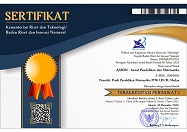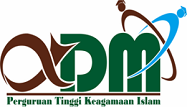Development of a PBL-Based e-module to improve the critical thinking skills of deaf and speech-impaired students
Abstract
Keywords
Full Text:
PDFReferences
Arifin, Z. (2017). Mengembangkan instrumen pengukur critical thinking skills siswa pada pembelajaran matematika abad 21. Jurnal THEOREMS (The Original Research of Mathematics), 1(2), 92-100. https://doi.org/10.31949/th.v1i2.383
Baker, S., Gersten, R., Dimino, J.A., & Griffiths, R. (2004). The sustained use of research-based instructional practice: a case study of peer-assisted learning strategies in mathematics. Remedial and Special Education, 25(1), 5-24. https://doi.org/10.1177/07419325040250010301
Bonk, C.J., & Smith, G.S. (1998). Alternative instructional strategies for creative and critical thinking in the accounting curriculum. Journal of Accounting Education, 16(2), 261-293. https://doi.org/10.1016/s0748-5751(98)00012-8
Chikeleze, M., Johnson, I., & Gibson, T. (2018). Let's argue: using debate to teach critical thinking and communication skills to future leaders. Journal of Leadership Education, 17(2), 123-137. https://doi.org/10.12806/V17/I2/A4
Dahlan, A.H. (2019). Pengembangan model pembelajaran pendidikan matematika realistik Indonesia (pmri) untuk meningkatkan ketertarikan belajar matematika. JUPITEK: Jurnal Pendidikan Matematika, 1(1), 8-14. https://doi.org/10.30598/jupitekvol1iss1pp8-14
Global Education Monitoring Report Team. (2024). Learners with disabilities and technology: advocacy brief.
Hidayani, Supriadi, Rusani, I., & Anwar, Z. (2021). Analisis berpikir kritis matematik siswa dalam pemecahan masalah matematika berdasarkan langkah polya. Jurnal Koulutus, 4(September 2021), 164-181. https://doi.org/10.51158/koulutus.v4i2.688
Kolo, E., Nahak, S., & Disnawati, H. (2021). Penggunaan model pembelajaran problem based learning untuk meningkatkan hasil belajar siswa materi aritmetika sosial. RANGE: Jurnal Pendidikan Matematika, 2(2), 115-122. https://doi.org/10.32938/jpm.v2i2.698
Kurniawan, D.E. (2021). Pengaruh metode pembelajaran daring terhadap minat belajar mahasiswa di masa pandemi covid-19. Jurnal Education and Development. https://journal.ipts.ac.id/index.php/ED/article/view/2442
Kusuma, Y.Y. (2021). Peningkatan hasil belajar siswa dengan menggunakan model pembelajaran problem based learning di sekolah dasar. Jurnal Basicedu, 4(4), 1460-1467. https://doi.org/10.31004/basicedu.v4i4.753
Marianto, A., Simatupang, G.M., & Anwar, K. (2024). Pengembangan media pembelajaran berbasis video animasi menggunakan aplikasi doratoon untuk meningkatkan minat belajar siswa pada materi bentuk aljabar kelas vii smp. Jurnal Ilmiah Matematika Realistik, 5(1), 55-63. https://doi.org/10.33365/ji-mr.v5i1.5080
Mukaromah, E. (2020). Pemanfaatan teknologi informasi dan komunikasi dalam meningkatkan gairah belajar siswa. Indonesian Journal of Education Management & …, 4(1), 180-185. https://jurnal.unigal.ac.id/ijemar/article/view/4381
Musa, F., Musa, F., Setyo, A.A., Trisnawati, N.F., & Sundari, S. (2023). Implementasi Model Pembelajaran Problem Based Learning Berbantukan Geogebra Untuk Meningkatkan Hasil Dan Minat. Jurnal Penelitian Matematika Dan Pendidikan Matematika, 6(1), 278-286. https://doi.org/10.30605/proximal.v6i1.2319
Musaad, F., & Suparman. (2023). Pengembangan e-modul berbasis problem based learning untuk memacu kemampuan berfikir kritis abad-21. AKSIOMA: Jurnal Program Studi Pendidikan Matematika, 12(3), 3162-3171. https://doi.org/10.24127/ajpm.v12i3.6119
Parameswari, P., & Kurniyati, T. (2020). Kemampuan berfikir kritis siswa dalam memecahkan masalah matematika. JPM : Jurnal Pendidikan Matematika, 6(2), 89. https://doi.org/10.33474/jpm.v6i2.6606
Rahayu, R., Iskandar, S., & Abidin, Y. (2022). Inovasi pembelajaran abad 21 dan penerapannya di indonesia. Jurnal Basicedu, 6(2), 2099-2104. https://doi.org/10.31004/basicedu.v6i2.2082
Rahmadhani, P. (2022). Analisis hubungan minat belajar dan hasil belajar materi hukum hooke di sman 10 kota jambi. Journal Evaluation in Education (JEE), 3(2), 45-48. https://doi.org/10.37251/jee.v3i2.242
Reilly, C.M., Kang, S.Y., Grotzer, T.A., Joyal, J.A., & Oriol, N.E. (2019). Pedagogical moves and student thinking in technology-mediated medical problem-based learning: Supporting novice-expert shift. British Journal of Educational Technology, 50(5), 2234-2250. https://doi.org/10.1111/bjet.12843
Riduan, M., Kusasi, M., Almubarak, A. Pengembangan e-modul bebrasis model scientific critical thinking (sct) untuk meningkatkan literasi sains dan hasil belajar peserta didik pada materi larutan penyangga. JCAE: Journal of Chemistry And Education, 5(2), 44-56. https://doi.org/10.20527/jcae.v5i2.1196
Ririn, R., Budiman, H., & Muhammad, G.M. (2021). Peningkatan kemampuan berpikir kritis matematis dan kemandirian belajar siswa melalui model pembelajaran problem solving. Mathema: Jurnal Pendidikan Matematika, 3(1), 1. https://doi.org/10.33365/jm.v3i1.772
Rosmalinda, N., Syahbana, A., & Nopriyanti, T.D. (2021). Analisis kemampuan berpikir kritis siswa smp dalam menyelesaikan soal-soal tipe pisa. Transformasi : Jurnal Pendidikan Matematika Dan Matematika, 5(1), 483-496. https://doi.org/10.36526/tr.v5i1.1185
S.Sirate, S.F., & Ramadhana, R. (2017). Pengembangan modul pembelajaran berbasis keterampilan literasi. Inspiratif Pendidikan, 6(2), 316. https://doi.org/10.24252/ip.v6i2.5763
Sadewo, Y. D., Purnasari, P.D., & Muslim, S. (2022). Filsafat Matematika: Kedudukan, Peran, Dan Persepektif Permasalahan Dalam Pembelajaran Matematika. Inovasi Pembangunan : Jurnal Kelitbangan, 10(01), 15-28. https://doi.org/10.35450/jip.v10i01.269
Siregar, N.F., Junaedi, I., & Mulyono, M. (2025). Analisis pemecahan masalah pada kurikulum matematika sekolah di singapore dan indonesia. Jurnal Karya Pendidikan Matematika, 12(1), 47. https://doi.org/10.26714/jkpm.12.1.2025.47-54
Wahyu Ariyani, O., & Prasetyo, T. (2021). Efektivitas model pembelajaran problem based learning dan problem solving terhadap kemampuan berpikir kritis siswa sekolah dasar. Jurnal Basicedu, 5(3), 1149-1160. https://doi.org/10.31004/basicedu.v5i3.892
Zeng, F., Deng, G., Wang, Z., & Liu, L. (2016). Wechat: a new clinical teaching tool for problem-based learning. In International Journal of Medical Education (Vol. 7, pp. 119-121). ncbi.nlm.nih.gov. https://doi.org/10.5116/ijme.5708.e5c4
DOI: http://dx.doi.org/10.30821/axiom.v14i1.22007
Refbacks
- There are currently no refbacks.
Copyright (c) 2025 Faida Musaad, Hidayani, Wa Ode Rusnia, Salama Bafadal, Sulkipli

This work is licensed under a Creative Commons Attribution-ShareAlike 4.0 International License.
p-ISSN: 2087-8249 | e-ISSN: 2580-0450
Indexed by:
AXIOM : Jurnal Pendidikan dan Matematika is licensed under a Creative Commons Attribution-ShareAlike 4.0 International License.











